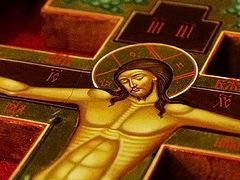The Apostles, holy fathers, and after them the whole liturgical tradition of the Church glorifies the Cross with the loftiest expressions. The holy apostle Paul “boasts” of the Cross. Praising the Cross, St. Ephraim the Syrian pronounces a long list from which we will cite only a fragment: “The Cross is the resurrection of the dead. The Cross is the hope of Christians. The Cross is the staff of the lame. The Cross is the consolation of the poor. The Cross is a bridle on the rich, the casting down of the prideful. The Cross is the monument to victory over the demons, the guardian of the young. The Cross is the hope of the despairing, the rudder of those at sea. The Cross is the harbor of the storm-tossed, the wall of those surrounded by enemies. The Cross is the father of orphans, the counselor of the righteous. The Cross is the consolation of the sorrowful, the protector of infants, the glory of men, the crown of elders.” St. Theodore the Studite repeats after him, “The Cross is riches more precious than any other riches. The Cross is the safest refuge for Christians. The Cross is a most easy yoke, placed upon the shoulders of Christ’s disciples. The Cross is the sweetest consolation for sorrowing souls. The Cross is the peacemaker and mediator between heaven and earth. By the Cross is death put to death, and Adam is returned to life.”
From the time of Cain, people have invented many ways to deprive their neighbors of life; the technology of execution is constantly developing and has reached great sophistication. In the ancient world (as well as later in the Middle Ages) executions were a public scene; they had their particulary presentation and theatricality. A person would be put to death before attentively gaping crowds—mainly in order to bring home the necessary fear to those for whom it is intended. But the one who was supposed to be executed received at this a certain tribunal—he could say something for people to remember, cast a final reproach at the executioners, or proclaim the rightness of his actions. Thomas Moore, when he was ascending the scaffold exclaimed, “I die the faithful servant of the king, but first of all of God!” These words are the words of a man who placed his duty before God higher than the will of the monarch, and they are repeated down generations.
Moore was decapitated; when a heavy blade severs the skin, neck vertebrae, nerves, muscles, and arteries so that the head rolls into a basket and the executed does not have time to feel any pain. A courageous man who is completely sure of his innocence can accept such a death with great calm, as did Thomas Moore. In this case death becomes a triumph, a demonstration of courage and steadfastness, which will inevitably produced an impression on people.
The Romans, on the other hand, did not at all want the execution of their opposition to turn into an inspiring demonstration of heroic steadfastness in the face of death. Like other empires before them—the Assyrian, Babylonian, Persian, and Macedonian—they knew how to deprive death of even the slightest marks of “beauty”, heroism, or romanticism. Whoever cast a gauntlet at their authority was to die not only torturously but also shamefully—the executed was not supposed to be left with so much as a drop of strength, a drop of dignity. The only impression he was supposed to make on people was fear and loathing.
Therefore the man was first flogged with special whips with lead pellets and sharp bone shards sewn into them that would rip his flesh into shreds, then he was forced to drag a heavy cross on his shoulders, after which large nails where driven into his hands and feet... This certainly left no room for inspiring speeches and beautiful legends.
This was an extreme defeat and dishonor. After all of this, the best one can do with the executed is to forget, as one forgets something repugnant and shameful. And now this loathsome instrument of death becomes an instrument of glory and victory; an instrument of horrific tortures becomes a banner of hope. How?
God changes it into an instrument of salvation. God became man in the person of our Lord Jesus Christ—a man in everyway like us, except for sin. And this Man accepts death—abhorrent and abominable death on the Cross—for the sake of man and for our salvation. He wins the victory and creates the Kingdom, but this is by no means the victory or kingdom that people usually want and which His contemporaries wanted.
In this world, the victorious are those who commit violence—those who can command their legionnaires to chop to pieces, impale or crucify anyone they wish. They are those who have the most legionnaires.
Christ is victorious by enduring violence against Him. In the world, the conquerors are those who bring death with their sharp swords and spears; Christ is victorious by accepting death. Holy Friday, the day when people killed God, becomes the day that God saved the world.
The kingdom of this world—and the Romans understood this perfectly—is held by force. Their rulers force people into subjection through fear of pain and death. Christ establishes the Kingdom that is upheld by trust and love.
He gathers His subjects not by coercion but by love and faith; not through threats but through exhortation; showing Himself not as a terrible conqueror with a bared sword, but the One Who humbly accepts death for others.
And this Kingdom conquers: Three centuries go by, and the roman emperor himself bows down before the Cross. And it conquers throughout eternity—when, in the words of St. Ephraim the Syrian, “The Cross appears in the sky with all the angelic hosts, illuminating the whole earth from end to end, brighter than the sun, and proclaiming the coming of the Master Christ.”
In glorifying the Cross, we proclaim our faith in what will finally conquer not by force, which frightens and coerces, but by love, which endures crucifixion. And we stand on the side of this love in a world that is ruled by force, because as members of Christ’s Church, we belong to the world to come, where there will be no more violence, but only love.




